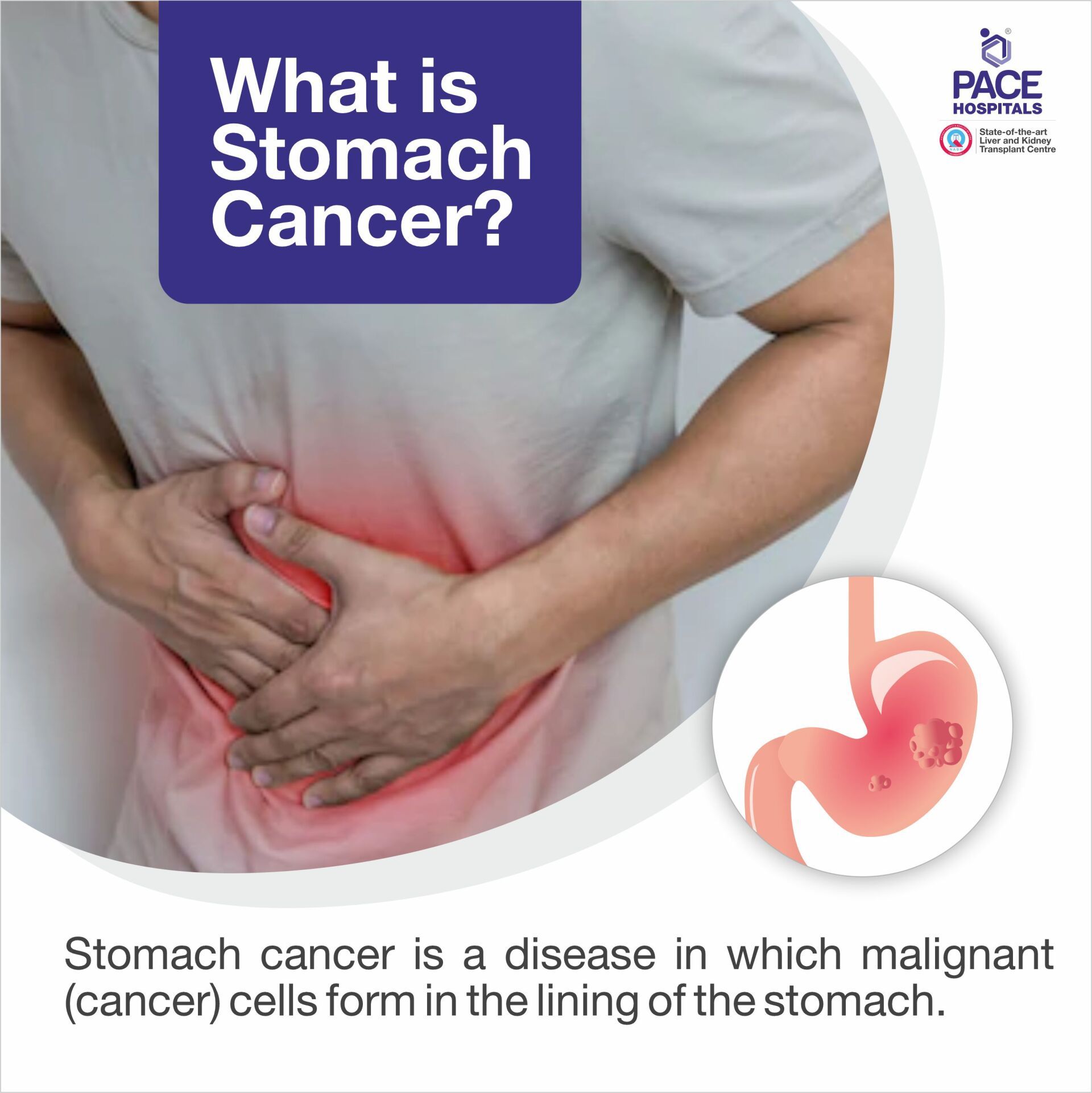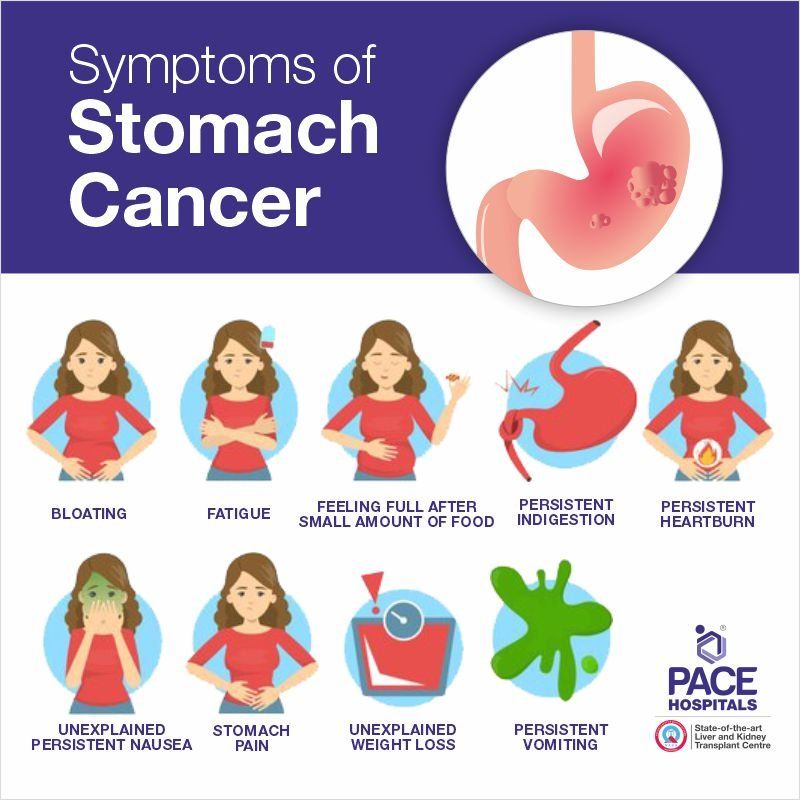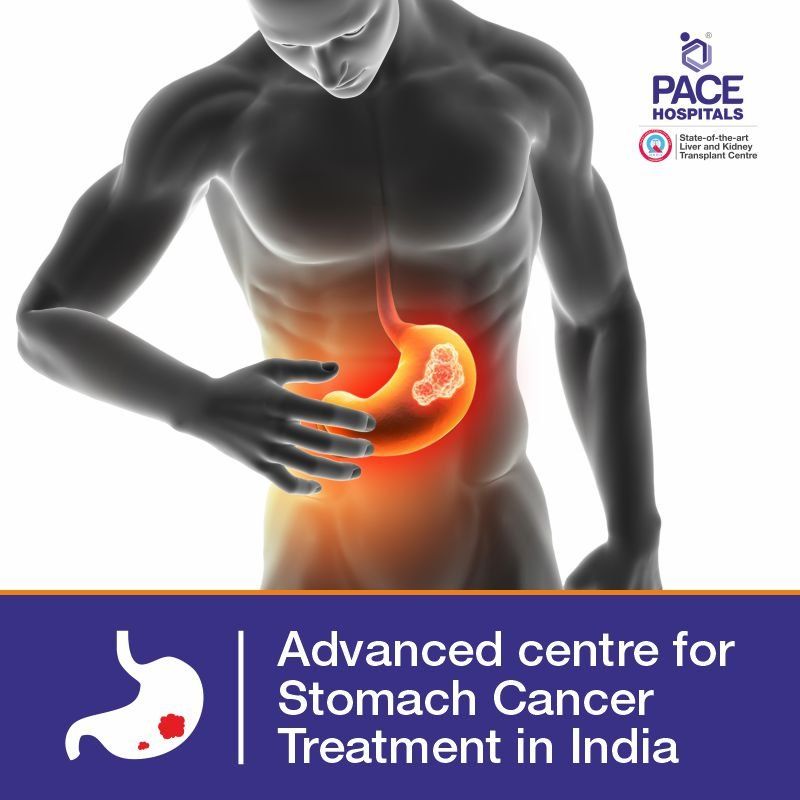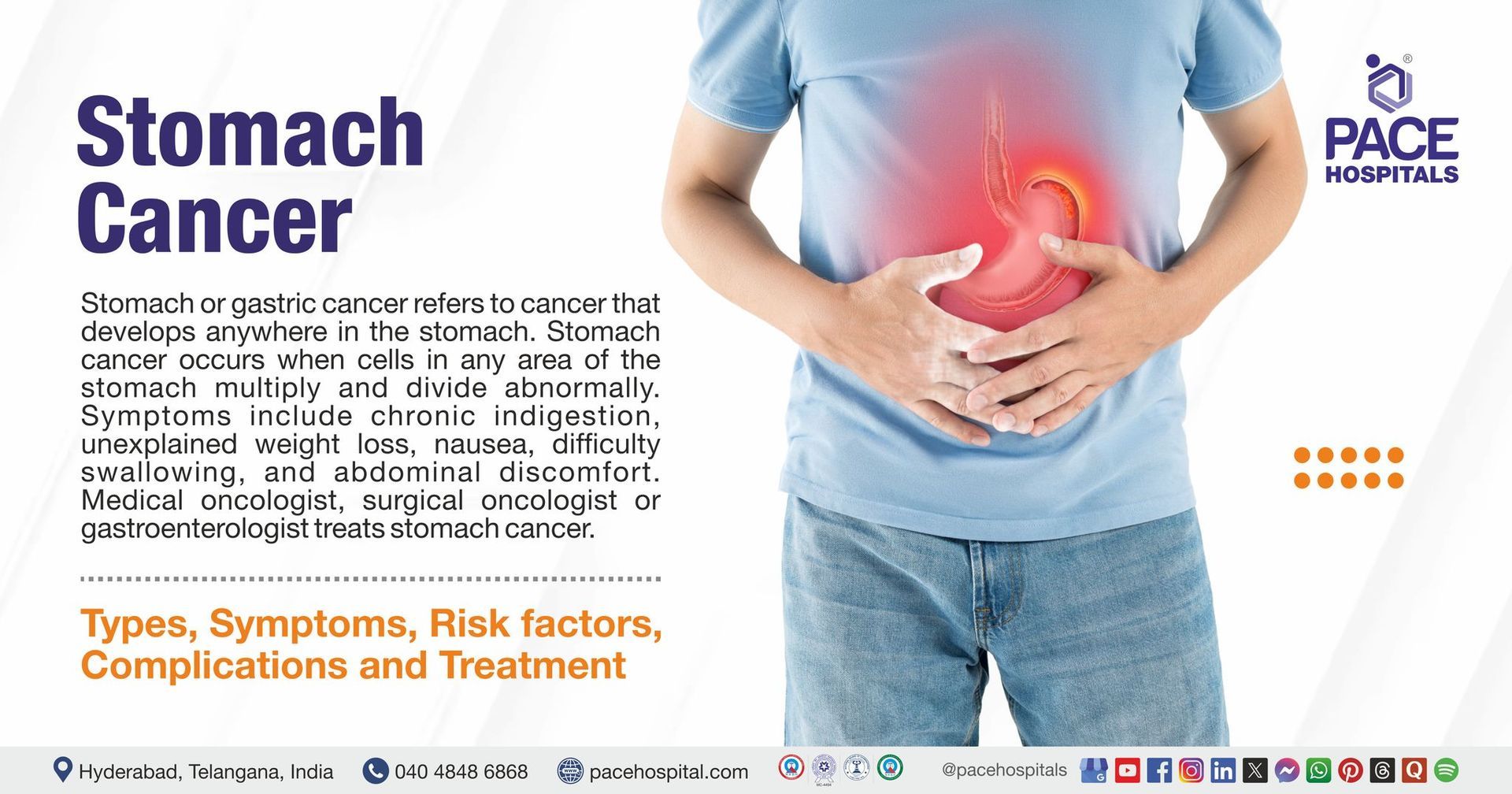Stomach Cancer Treatment Hospital in Hyderabad | Surgery, Types & Cost
At PACE Hospitals, team of best stomach cancer doctor, stomach cancer specialist, medical oncologist, surgical oncologist and GI oncologist are having extensive experience in treating all types of stomach cancer / gastric cancer - adenocarcinoma, lymphoma, carcinoid cancer and gastrointestinal stromal tumour.
Request an appointment Stomach Cancer Treatment
Cancer Appointment Query
Advanced Centre for Stomach Cancer Treatment in India
We are one of the Advanced Centre for Stomach Cancer Treatment in India backed up with team of the best stomach cancer doctor, stomach cancer specialist, medical oncologist, surgical oncologist, GI oncologist, cancer surgeons, paramedical staff, nutrition and physiotherapist in India.
Stomach Cancer Specialist Team at Pace Hospitals, evaluate the patient condition and stage of the stomach cancer according to that chemotherapy, surgery, endoscopic mucosal resection, radiation therapy, chemo radiation, targeted therapy and/or immunotherapy is advised.
What is Stomach Cancer / Gastric Cancer?
Cancer that starts anywhere in the stomach is called gastric or stomach cancer. The stomach has three parts, cardia (Upper portion which connects with esophagus – the food pipe), fundus / corpus (Middle part that is the body of the stomach) and antrum and pylorus (The lower part of stomach).
The stomach, as we all know, has a very important role as it mixes and breaks down the food by releasing gastric juices and digests the food so that our body can absorb it. Then the food moves into the small intestine for further digestion. Gastric juices and acid are secreted by the glands in the wall of the stomach.

Symptoms of Stomach Cancer
The warning, that something is not right!
If we know the symptoms, we can be more cautious and report to our doctor for evaluation at the earliest. As the survival depends on the stage of the cancer, earlier it is detected, better the survival outcome! The following are the typical nonspecific gastric cancer / stomach cancer symptoms:
- Fatigue - an overall feeling of tiredness or lack of energy
- Feeling bloated after eating - due to excess intestinal gas and digestive contents
- Feeling full after eating small amount
- Severe and persistent heartburn
- Severe and unrelenting indigestion
- Chronic unexplained nausea and vomiting
- Unexplained Stomach pain
- Unexplained Weight loss

Types of stomach cancer
The evaluation, treatment and prognosis, all depend on the type of the gastric cancer, which is determined by the cells that make up the tumour:
- Adenocarcinoma (originates in the glandular cells) - accounts for the majority of stomach cancers. It is of various subtypes -intestinal, diffuse, indeterminate or mixed type
- Lymphoma (originates in the cells of the immune system) - a relatively rare form of stomach cancer
- Carcinoid cancer or cancer that begins in hormone-producing cells-rare cancer which originates in the hormone-producing cells
- Gastrointestinal stromal tumour (GIST, originates in nervous system tissues) – another relatively rarer form of gastric cancer.
As most of the types of stomach cancers, other than adenocarcinoma, are rare, when doctors use the term “stomach cancer” they mean adenocarcinoma.
Risk factors and causes of stomach cancer
If we know, what predisposes us to develop this cancer, we can take measures to protect us! The etiology of gastric cancer is multifactorial, more than 80% of cases have been attributed to H. pylori infection and in addition, diet, lifestyle, genetic, socioeconomic and other factors contribute to gastric carcinogenesis.
Helicobacter pylori
It is a gram-negative bacterium that lives and multiplies in stomach mucosa and triggers the progressive sequences of gastric lesions (from chronic gastritis, gastric atrophy, intestinal metaplasia, dysplasia, and finally gastric cancer). H. pylori infection is considered one of the most important risk factors for non-cardia gastric cancer. Many studies conducted in various parts of the world observed 2-3-fold increase in gastric cancer among individuals exposed compared to non-exposed to H. pylori infection. H. pylori infection is mainly acquired in childhood through oral ingestion, and infection may persist throughout the life The Cag A gene, which is the main virulence factor of H.pylori, has been identified to be responsible for the development of gastric adenocarcinoma. A point of concern is that the seroprevalence of H. pylori infection in adult population in India is 55%–92%, as compared to 44% and 55% in Chinese and Japanese population, respectively
Diet
Diet plays a major role in gastric carcinogenesis. Globally, literature suggests that populations at high risk for stomach cancer consume diets rich in starch and poor in protein quality, and are not inclined to eat fresh fruits and vegetables. Both high starch and low protein diet may favour acid-catalyzed nitrosation in the stomach and cause mechanical damage to the gastric lining and none or low-starch vegetable including green yellow vegetables, cruciferous and allium vegetables (garlic and onion) and fruits are considered to be probable protective factors. Limited evidence recommends that pulses (including soy) and selenium are also protective in nature. The recent decline in the incident of stomach cancer in many countries may be in part explained not only by higher consumption of fruit but also due to highly reduced intake of salt, preserved foods as well as the availability of refrigeration.
In Indian scenario, pickled food, high rice intake, spicy food, excess chilly consumption, consumption of very hot food, smoked dried salted meat, use of soda and consumption of dried salted fish have emerged as significant dietary risk factors. These practices are prevalent in southern and eastern states of India, a where a higher frequency of gastric cases are also observed.
Studies strongly support the role of excessive salt intake in gastric carcinogenesis. Consumption of large amount of salted fish, soy sauce, pickled vegetables, cured meat and other salt-preserved foods enhances H. pylori colonization, and increases the risk of gastric cancer through direct damage to the gastric mucosa resulting in gastritis. Salt is also known to induce hypergastrinemia and endogenous mutations, promoting epithelial cell proliferation which eventually leads to parietal cell loss and gastric cancer progression. Salted tea (Nuun Chai), a drink of the poor farmers of Kashmir, has been very strongly implicated it carcinogenesis. A statistically significant interaction between H. pylori infection, smoked, salted meat and Sa-um (fermented pork fat, a locally made dish in Mizoram) has been documented.
Dietary nitrates are found either naturally in foods such as cabbage, cauliflower, carrot, celery, radish, beets, and spinach or added during preservation. In addition, the nitrate content of fertilizers, soil, and water also contribute to dietary nitrate. Dietary nitrate is converted to carcinogenic N-nitroso compounds (NNC) by gastric acid thereby increasing gastric cancer risk. Small quantities of preformed NNC and nitrosamines may also be present in some foods including cured meats, dried milk, instant soups, and coffee dried on direct flame
Lifestyle
Alcohol, a gastric irritant, is an important risk factor for gastric cancer. Many studies have reported an increased risk of stomach cancer in men and women who regularly consume strong alcoholic beverages.
Globally, tobacco smoking has been indicated as an independent risk factor for gastric cancer. In India, not only tobacco smoking but also tobacco chewing is highly prevalent. Tobacco is used in various forms like, hukka, snuff, bidis, cigarettes, taibur, Meiziol, etc. This is one of the main reasons for male predominance of gastric cancer.
Weight
A meta-analysis of many studies indicated that overweight status and obesity are associated with an increased risk of gastric cancer. The strength of the association increases with an increase in the body mass index (BMI)
Genetic susceptibility
The first documented report of familial predisposition to gastric cancer was described for Napoleon Bonaparte’s family, with Napoleon, his father, grandfather, brother, and three sisters, all dying of stomach cancer at a relatively early age. In addition to the genetic predisposition to develop cancer, family members usually share the same environment and have similar socioeconomic status. These risk factors act independently or in conjunction with genetic factors, thereby increasing the risk of stomach cancer
Globally literature suggest that polymorphism in genes involved in inflammation, that is interleukin, toll-like receptor 4, hyuman leukocyte antigen, metabolic phase I enzyme viz CYP1A1, metabolic phase II enzyme viz GSTM1, GSTT1 (Glutathione-S-transferase) [35] and NAT1, NAT2 (N-acetyltransferase), DNA repair Viz XRCC1, are involved in development of gastric cancer. Indian studies on this topic are however limited because of multiple factors (inadequate sample size, improper study designs and inability to controls for confounders).
A family history of gastric cancer is observed in up to 10–15% of cases. A history of gastric cancer in siblings or parents is associated with an at least 2 times increased risk of gastric cancer. Gastric cancer can also be a part of inherited syndromes such as hereditary nonpolyposis colon cancer and hereditary diffuse gastric cancer and Li-Fraumeni syndrome.
Occupations
A positive correlation has been recognized between increased stomach cancer risk and a number of occupations including mining, farming, refining, and fishing as well as in workers processing rubber, timber, and asbestos. Occupational exposure to dusty and high temperature environments such as in cooks, wood processing plant operators, food and related products machine operators was associated with a significant increased risk of gastric cancer of the diffuse subtype.
How do you diagnose stomach cancer?
Once the patient report to the doctor, the doctor will then perform a series of investigations to confirm the diagnosis and evaluate to find the stage of the cancer. These are very important steps, as diagnosis and type and stage of cancer determine further treatment and survival of the patient. Commonly used procedures to diagnose stomach cancer include:
- Endoscopy – A thin tube with a tiny camera is passed down the throat and into the stomach to look for the tumour.
- Biopsy of the Tumour - a piece of tissue sample is taken as biopsy during endoscopy for further evaluation, a very essential step as without tissue diagnosis, no therapy can be given.
- Endoscopic Ultrasound – done to assess the depth of tumour invasion, required for staging of the cancer.
- Imaging tests - Imaging tests to find the extent of disease, for staging, include computerized tomography (CT) scan, MRI, positron emission tomography (PET) and a barium swallow.
- Exploratory surgery - Once a decision is taken to operate, exploratory laparoscopy is undertaken to confirm operability.
Stomach Cancer Stages
The stage of gastric cancer determines the treatment and the overall survival of the patient:
- Stage I - the tumor is limited to the layer of tissue that lines the inside of the stomach. Cancer cells may also have spread to a limited number of nearby lymph nodes.
- Stage II - the tumor has spread deeper, growing into the muscle layer of the stomach wall. Cancer cells may also have spread to more of the lymph nodes.
- Stage III - the cancer may have grown through all the layers of the stomach, or it may be a smaller cancer that has spread more extensively to the local lymph nodes.
- Stage IV - This stage indicates that the cancer has spread to distant areas of the body.
Frequently Asked Questions (FAQs) on Stomach Cancer
Which Is the best Stomach Cancer Treatment hospital in Hyderabad, India?
PACE Hospitals, Hyderabad, is one of the most trusted centres for diagnosing and treating stomach cancer with advanced, evidence-based oncology care.
Our multidisciplinary team, including gastroenterologists, medical oncologists, surgical oncologists, radiation oncologists, radiologists, and nutrition experts — provides comprehensive care for:
- Early-stage and advanced stomach cancer
- Gastric adenocarcinoma
- Gastrointestinal stromal tumors (GIST)
- Gastric lymphoma
- Neuroendocrine tumors of the stomach
- Recurrent or metastatic stomach cancer
We have highly successful outcomes with advanced endoscopy, high-end imaging, minimally invasive gastrectomy, chemotherapy, targeted therapy, radiotherapy, and nutritional rehabilitation programs, PACE Hospitals ensure safe, accurate, and personalized cancer care backed by cashless insurance, TPA tie-ups, and complete documentation support.
How common is stomach cancer?
Stomach cancer is not very common but recorded high mortality rate in compared to common cancers like breast cancer and colon cancer.
What is the first sign of stomach cancer?
There is no definite first sign of stomach cancer, commonly patients represent with bloating, nausea, acid reflux, Indigestion and abdomen discomfort. In this case patients need to go for thorough checkup to rule out stomach cancer risk.
Can gastritis lead to stomach cancer?
Gastritis can cause stomach ulcers and stomach bleeding. If not treated during initial stage, long-term gastritis (stomach inflammation) can lead to stomach cancer.
What Is the cost of Stomach Cancer Treatment at PACE Hospitals, Hyderabad?
At PACE Hospitals, Hyderabad, the cost of stomach cancer treatment typically ranges from ₹2,800 to ₹4,60,000 and above (approx. US $34 – US $5,520), offering an affordable and specialized option for comprehensive gastric cancer care. However, the final cost depends on:
- Stage and type of stomach cancer
- Need for diagnostic tests (endoscopy, scans, biopsy)
- Surgery type (partial/total gastrectomy, open/laparoscopic)
- Need for chemotherapy, radiation, or targeted therapy
- Hospitalization and postoperative care
- Oncologist consultations and treatment cycles
- Co-existing conditions (malnutrition, anemia, liver disease, diabetes)
Early-stage cancer with limited treatment requirements falls at the lower range, while advanced disease requiring multimodal therapy falls in the higher range.
After complete evaluation and staging, our oncology team provides a personalized treatment plan and a transparent cost estimate based on the patient’s clinical condition
Why should we be worried about stomach / gastric cancer?
Cancer of the stomach ranks among the top five most common cancers and is one of the leading cause of cancer death worldwide. In India, the number of annual new gastric cancer cases is approximately 34,000, with a male predominance (male-to-female ratio, 2:1) and it is the second most common cause of cancer related deaths among Indian men and women in the age between 15 and 44. In India, the age range for stomach cancer is 35-55 years in the South and 45-55 years in the North. It is estimated that by the year 2022, approximately 55,000 new gastric cancer cases will be reported annually in India. Globally, gastric cancer accounts for nearly 1 million new cases and 7,38, 000 deaths annually, and these figures are gradually increasing! What’s even more distressing is that the case-fatality ratio of gastric cancer is higher than for common cancers such as colon, breast, and prostate cancers. The reason for this increased fatality is because, despite advances in diagnosis, the disease is usually detected at a very advanced stage, by then the cancer has already penetrated beyond the wall of the stomach. The reason it is detected at a late stage is due to the fact that most patients do not have any complaints or experience vague and nonspecific symptoms in the early stages and they do not report to the doctor for evaluation. By the time they become symptomatic, its already too late! Furthermore, surgery and chemotherapy have limited value in advanced disease and Stage IV has a very poor prognosis with 5-year survival rate of only around 20 per cent.
Globally, gastric cancer rates shows marked geographical variation, with high-risk areas in Japan, China, Eastern Europe and certain countries in Latin America. In India, the incidence of gastric cancer has been relatively high in southern India, namely in Chennai; however, recent data indicate that the incidence rates are the highest in the north-eastern region (Mizoram). These differences in incidence rates can be attributed to many factors but refer particularly to differences in dietary habits, and infection to Helicobacter pylori.
What can we do to prevent gastric cancer?
One of the most important aspect about gastric cancer is that it can be prevented. Primary prevention of gastric cancer focuses on the modifiable risk factors for gastric cancer. Strategies that have been evaluated include eradication of H. pylori infection and dietary/lifestyle interventions. Eradication of H. pylori prevents the development of pre-neoplastic changes of the gastric mucosa and has the potential to reduce the risk of gastric cancer development. The infection by H. pylori can be prevented by interrupting transmission of the infection by promoting sanitary habits, good waste disposal, clean water supply and planned housing to minimize overcrowding. American and European guidelines recommend H. pylori eradication in all patients with atrophy and/or intestinal metaplasia and in all first-degree relatives of gastric cancer patients, in addition to endoscopic and histological surveillance.
Modulation of dietary patterns and changes in cooking practices are believed to significantly reduce gastric cancer risk. Refrigeration of food that obviates the use of salt as a preservative, reduces the possibility of molds overgrowing in food, and renders conversion of nitrates into NNC more difficult in cured and pickled foods. Dietary interventions include increased intake of non-starchy vegetables including specific allium (particularly garlic) vegetables as well as fresh fruits (rich sources of antioxidants), which can ensure adequate vitamin C and dietary fibre, and avoidance of increased salt intake. Tobacco and alcohol consumption are other risk factors that are to be targeted by lifestyle modifications. There is limited evidence suggesting that chilly is associated with an increased risk of stomach cancer. Salt has been shown to directly damage the stomach lining and substantial amount of evidence from various international studies suggests that salt as well as salted foods are a probable cause of stomach cancer.
As survival depends on the stage of cancer, early diagnosis defiantly prolongs survival. Awareness about gastric cancer, risk factors and measures taken to prevent the cancer along with early reporting to the gastroenterologist for evaluation of symptoms will help us to prolong survival and these aspects constitute the crux of this article. I have tried to cover the basic and relevant aspects of gastric cancer, in case there are any issues you need more clarification about, you are most welcome to contact us.
How much does stomach cancer treatment cost in India?
Stomach cancer treatment cost in India ranges vary from ₹2,10,000 to ₹5,75,000 (US$2500 to US$6900). However, cost of stomach cancer treatment in India may vary depending upon the different hospitals in different cities.






